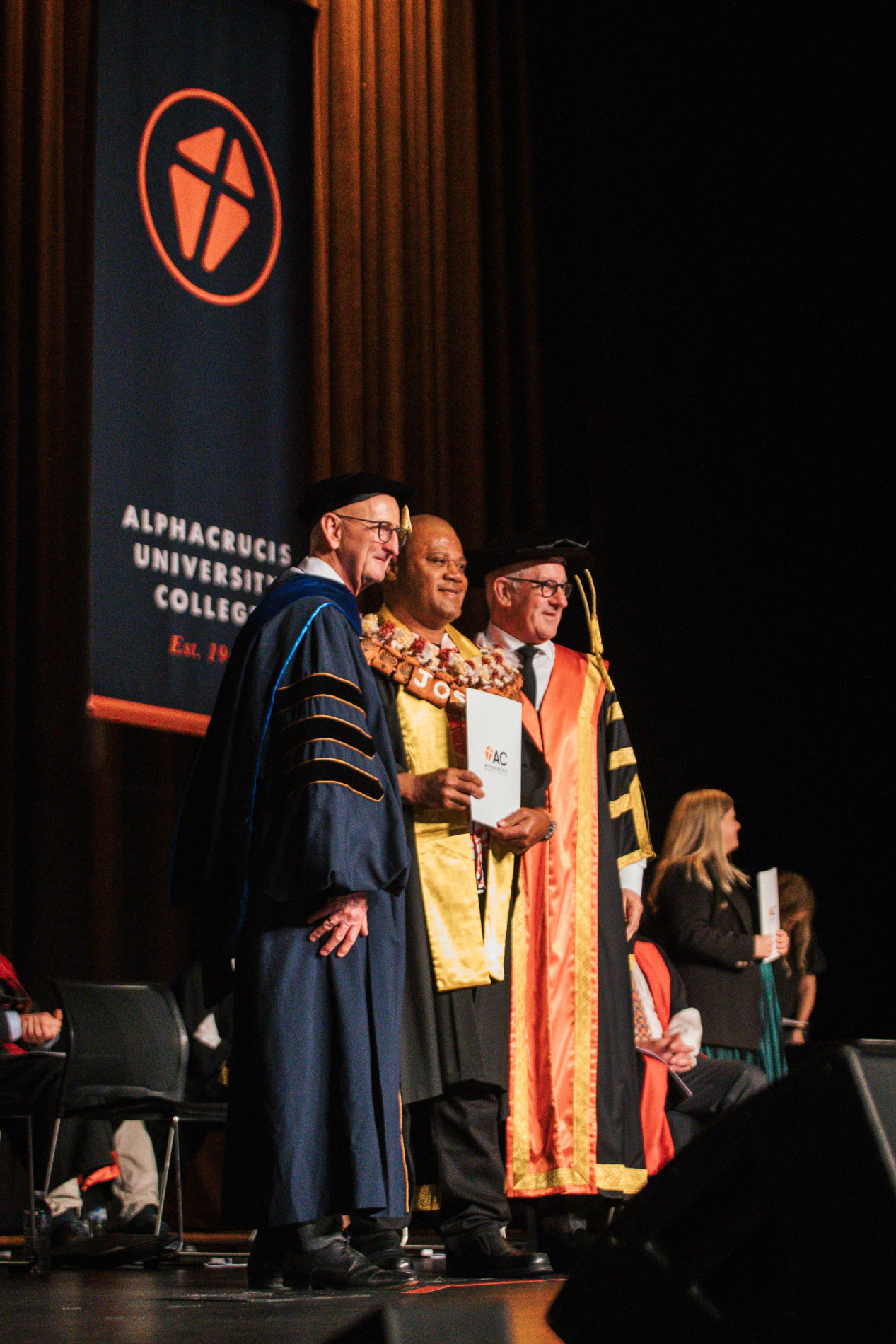
Delivering impact: how our partnership with Alphacrucis University College is changing the lives of Pacific Islander aged care workers
First published: October 2024
Sanctuary Recruitment and Pulse Staffing Australia, under the global healthcare partner Acacium Group, have secured a bid for this year’s Pacific Australian Labour Mobility (PALM) Scheme. Aiming to fill labour gaps and alleviate work shortages across the country in a multitude of sectors, the PALM scheme allows for workers from the nine Pacific Islands and Timor-Leste to migrate to Australia on a visa lasting up to four years to join Australia’s workforce in their respective industries. Benefitting the participant, the organisation and the participants families, they can expand their knowledge and skillset, whilst sending income to their loved ones before returning to their home country.
A conversation on empowering overseas workers through education and opportunity
Focusing on providing aged care workers to residential homes across the country, we have partnered with Alphacrucis University College (AC) to deliver a premium level of education to our 40 students, with each graduate being awarded a Cert III in Individual Support (Ageing) prior to transitioning to Australia. Facilitating this program is AC’s Vice Provost, Professor Lily Arasaratnam-Smith. With over 20 years of experience that includes obtaining a PhD (Communication) from Rutgers University, USA, and publishing numerous articles and books, including her most recent work Communicating in Intercultural Spaces (Routledge, 2024), Lily’s wealth of knowledge is invaluable to this project.
Lily’s first exposure to PALM was in 2023, when she oversaw the project to deliver a cohort of 100 participants in collaboration with Bolton Clarke as an industry partner. Reflecting on the process as a ‘steep learning curve’, Lily discusses how the program has benefitted the Fijians who got a qualification and opportunity to work in Australia and how Alphacrucis ensured a high-quality level of education and aided in a smooth international transition.
Q. What was your first experience with facilitating a project as big as the PALM Scheme like?
Well, there was certainly a lot to learn! I was new to each aspect of the project; it was even my first time visiting Fiji. We were extremely fortunate as we have a fantastic program coordinator based in Fiji who helped bridge the cultural differences and provided connections to church leaders, which is important to ourselves and our students. Fiji is predominantly a Christian country, and given Alphacrucis’ faith orientation, the project was a good fit.
Q. Given the high interest rate in the program, how do you choose who would be enrolled on the course?
Last year, the industry partner and the Labour Sending Unit (LSU) made the initial selection from which AC chose the students. The LSU ensures that only eligible candidates are put forward to the employers for their consideration. This time around, we interviewed the workers from the shortlist for suitability to study alongside PALM Scheme representatives from Acacium Group who assessed the candidates from the perspective of employment and how they would perform giving care to residents. Working hand in hand with the organisations made for a better, more thorough selection process.
What makes a great candidate?
From my perspective, I am looking for language fluency. English is one of three official languages in Fiji, which is one of the reasons why Fiji is a good fit for the program. Both spoken and written English are of high importance, but the key is comprehension. You can be fluent in a language, but if you are unable to communicate effectively then it will have a direct effect on the services you can provide to Australia’s ageing population. I am also looking for life experience and versatility. It’s a big commitment to move overseas to work in an environment with cultural differences, so someone who is flexible, adaptable and mature enough to handle the change is the candidate we are looking for.
A move on this scale may not always be smooth sailing. How did last year’s cohort cope with the transition?
Our participants are temporarily leaving their families, so we want to be there for them as much as possible. We understand there may be challenges along the way, and Bolton Clarke facilitated the transition fantastically. After they arrived in Australia, they spent a week with the students educating them on living and working here. They assisted them with necessary tasks like opening a bank account and getting to know their surroundings. Having this vital information is just as important as knowing how to perform well in their job role. Alongside this, there was a four-week placement period during which they could ask academic questions, with time allocated to speak to the program coordinator and access pastoral care.
Given your close connections with the students, what would you say their main desires for participating in the scheme are?
A lot of them expressed that they wanted a better lifestyle for their families and themselves. Earning a good income whilst gaining invaluable knowledge and lifelong job specific skills was a strong reason, along with some wanting to be reunited with extended family already in Australia.
How do the students from the first year’s cohort keep in contact? Is there a way for them to keep the connections that they’ve made during their studies?
Absolutely. We encourage communication across all our alumni. Alphacrucis offers various alumni platforms to facilitate this, and students from former cohorts maintain connection via social media.
Regarding the course, it’s condensed down to be completed in 22 weeks. How has Alphacrucis facilitated this change and what adaptations have been made for the students?
We appreciate that it can be intense, as its run on a full-time basis (5 full days a week). We ensure to schedule in adequate breaks, social hours, and provide lunch so that students are kept engaged for the whole day. We champion every achievement, as we believe in reward and recognition during the course. Due to unreliable internet connections in parts of Fiji, we offer paper-based delivery. Everything is printed so information is always on hand should the students want to refer to it at any time. We emphasise the importance of understanding the work environment, so we heavily focus on topics such as HR practices, laws, and regulations surrounding the Australian aged care industry. For assessment, they are graded on both theory and practical, through competency-based tasks, and roleplay. Roleplay is done in the class with fellow students. During practical placements, students have to demonstrate competency with tasks involving actual aged care residents.
 What happens if a student doesn’t pass the course?
What happens if a student doesn’t pass the course?
We want everyone to succeed and provide them with as much support as possible for them to do so, but we understand the need to supply competent, highly skilled workers to aid with care delivery. The course is made of 15 units, and a student isn’t deemed competent unless they demonstrate competency in all 15. Sometimes, life gets in the way and a participant cannot complete the course. As a contingency, we do recruit a slightly higher number of students to be prepared for potential attrition. Our retention rate in 2023 was 97%.
This is your second time assisting with the transition of workers to Australia. What feedback did you receive from your industry partner on the first cohort?
Maintaining our client relationships is of the upmost importance to us, so we always welcome feedback. What we have received has been wonderful. For example, Sara Allotta, Group International Sourcing Manager at Bolton Clarke, commented on our partnership, stated that ‘[Bolton Clarke’s] collaboration with Alphacrucis University College underscores our commitment to our mission helping our residents live a life of fulfilment. Through our partnership, we are delivering a Certificate III in Individual Support to 100 workers in Fiji, as part of the Aged Care Expansion stream of the Pacific Australian Labour Mobility (PALM) scheme. Alphacrucis University College has demonstrated exceptional support, flexibility, and collaboration making them an invaluable partner in our mission. Emphasising the importance of such partnerships which assists in furthering our global impact in providing quality care to those in need.”
How have the students from 2023’s cohort been received by the residents?
Extremely well. One heartwarming story came from a student who cared for a resident who experienced limb amputation. The student offered care and support to the resident without fear and received resounding praise from the resident. Overall, coworkers, managers, and resident themselves have been positive. Our goal is to train and deliver aged care workers who really have the wellbeing of their residents as heart, and we’re proud of our students’ accomplishments.
How would you summarise your key takeaway from the PALM Scheme?
With the caveat that my experience is limited to aged care workers and training students for the aged care industry in Australia, I think it’s a great opportunity for the participants to better their lives. The opportunity to get a qualification and four years of industry experience in Australia while having the financial benefit of being able to support their families back home and pay off debts is a tangible benefit of the scheme based on participants’ feedback.
Find out more about our involvement with the PALM Scheme
Our cohort of 2024 is currently nearing completion of their Cert III in Individual Support (Ageing), ready to embark on their four-year placement in Australia. To connect with our PALM Scheme representatives, reach out to us today


 What happens if a student doesn’t pass the course?
What happens if a student doesn’t pass the course?
